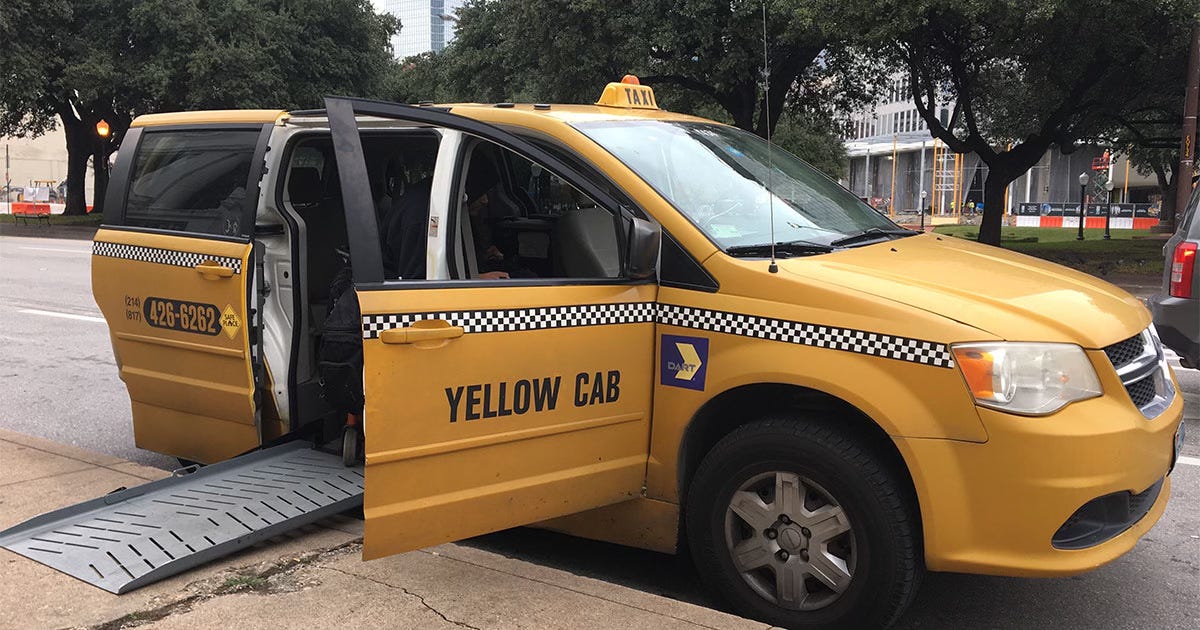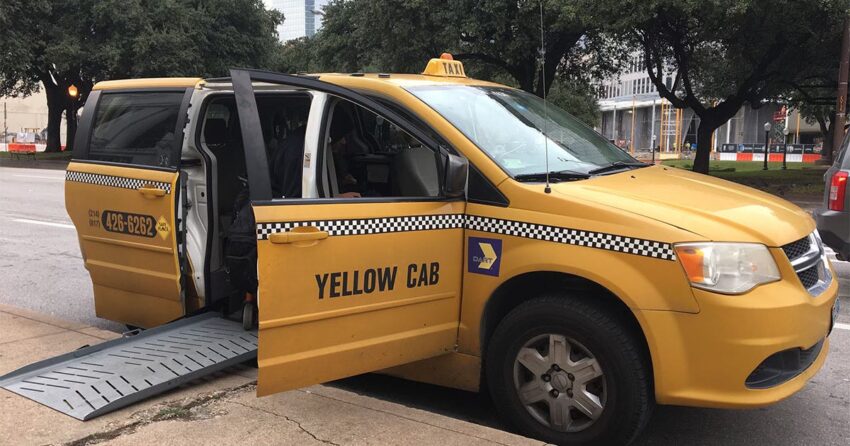Written by John Morris, WheelchairTravel.org

Dallas, Texas is a major American city and home to Dallas-Fort Worth International Airport, one of the country’s largest airports. Dallas is a largely wheelchair-friendly city which I have catalogued in the free Dallas, Texas Wheelchair Accessible Travel Guide. I hope you travel there — I’m sure you will love it just as much as I do.
But, if you plan to visit, be prepared to rent an accessible van or ride public transportation, as you’re unlikely to find a wheelchair taxi. If you turn up at DFW Airport and need a wheelchair accessible ride, you won’t find one. The only accessible transportation available from DFW Airport, apart from the light rail, was the SuperShuttle shared ride vans — the pandemic killed those.
While the picture above is of a wheelchair taxi in Dallas, the city contracts that van for its paratransit service. Someone like me, a visitor and traveler, does not have easy access to Dallas paratransit and, while Yellow Cab might accept my order for an accessible taxi, none will show. I have tried many, many times. I have had hotels call on my behalf. I have been stranded at DFW Airport late at night because there is no accessible transportation, and no one could do anything to help.
This is not a problem limited to the City of Dallas. Wheelchair taxis are disappearing from many cities, if they ever existed at all. Countless small towns (and big ones) are devoid of private transportation options for wheelchair users. When I wrote “Quarantined for Life? Disabled People in Rural Areas Lack Accessible Transportation,” many readers who live in places that are bona fide cities reported experiencing the same lack of transportation access. “I have many places that I would like to go but no way to get there,” wrote one reader.
Governments at the local, state and federal levels have fallen asleep at the wheel — rideshare has eviscerated the taxi business, while Uber and Lyft have failed to provide wheelchair accessible services in all but the handful of cities that have had the courage to stand up for disabled residents and visitors. Truth be told, it’s not even a handful and, even in those cities, accessible rideshare is far from equitable.
We deserve better, and it is time for the government to revise the regulations for taxi and rideshare services. The loopholes cab companies use to leave disabled people stuck overnight in gas station parking lots must be closed.
Tomorrow, I will be testifying before the National Council on Disability, which is seeking public comment on the following questions related to ground transportation:
- If you requested a wheelchair accessible van (WAV) through a taxi company, did the company have a WAV? If the company did not have WAVs in its fleet, did the taxi service offer to provide you a WAV through a different company? Was the price comparable to a non-accessible taxi?
- If you requested a WAV from a rideshare company, did the company have a WAV? If not, were you referred to a service that did? Was the price comparable to a non-accessible rideshare?
- Have you filed a complaint with the U.S. Department of Justice or the U.S. Department of Transportation about discrimination by a taxi company or a rideshare regarding lack of WAVs? If so, what was the result?
- Is paratransit available in your neighborhood? What are the pros and cons of using this service? What should be changed?
You also are invited to address the council during the public meeting, or to share written answers to these questions.
The National Council on Disability advises the President of the United States and the federal government on matters of disability policy — your testimony will help council members better understand the challenges wheelchair users face in securing transportation and may influence their policy recommendations.
For more information on Thursday’s public meeting, scheduled for 1 p.m. to 5:30 p.m. EST (New York time), visit the National Council on Disability website. Public comments will be heard from 4 p.m. to 4:30 p.m. and it is critical that you register in advance (instructions provided at the link above).
I hope to see you at the virtual meeting tomorrow!
Some housekeeping — A true newsletter will follow later this week, featuring the release of my updated and expanded Boston Wheelchair Accessible Travel Guide, which has taken a lot of time and effort to develop. The section outlining wheelchair accessible things to do in Boston is 4,000 words, and that is just one component of the most detailed travel guide I have ever produced. I am excited to share it with you!
Wishing you all the very best,
— John
